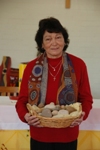Elsie Heiss was born into the Wiradjuri Nation and spent most of her early days in Cowra and Griffith in NSW. She says of her life as a child: 'I was born on Erambie Mission, Cowra, New South Wales, the youngest of six children. Living on the mission was hard on the families, as there was very little food. Schooling was poor because this was a mission school with second rate teaching. I think they thought it is good enough for black kids.
In the mid 1940's my father James and mother Amy decided to leave the mission and seek a new place to raise the family. We arrived in Griffith at 5pm one the afternoon (as told by my father). The Station Master at Griffith ran from his office and looked flabbergasted at us. "Who owns all this", he asked? My dad replied, "Do you mean the kids or the bags? Yes, they belong to me". "You can't stay here. What are you doing here anyway?" "I'm trying to find a place for my family to settle, work and have a life. But don't worry, just point us to the nearest water hole and we will be gone." Just then the Station Master had more to deal with because off the train also came my uncle and aunty with their eleven kids and more bags.
This was our invasion to the Riverina. Summer was fruit picking, there was plenty of work, food and alas, school had to come. This was a nightmare. What did we know about attending a white school where we were pushed around and treated badly by both teachers and the other children. Somehow within this time a culture of peace was born or given rebirth.
The good times came when we moved to the river. This was in the winter months when fruit picking was over. The place was Darlington Point, on the Murrumbidgee River. Times were good here, there were lots of Aboriginal families camped on the river banks. My father and brothers could build our humpy in no time, while my mother sewed the bats together to make the shelter. Who would have thought that this sacred place would be sacrificed to make way for a caravan park and the river cleaned out of fish and lobsters? The times I ran through the long fresh grass, believing that wherever we camped the authorities would move us on. This was called "progress". Although we had survived such tremendous difficulties in our lives so far, my journey was really just beginning.'
Elsie moved to Sydney in her late teens and met and was married to her much loved Joe for 45 years (Joe died in November 2005). Elsie is a respected Elder in the local community. However, this picture of a wife, mum and grandma proud in her identity is just the front cover of a life story of strong faith, dedication to change, and a woman of action and challenge. This action has taken a lifetime of hard work and commitment to bringing about justice for her people and recognition, respect and action from the Catholic Church in regard to acceptance of Indigenous cultures and practices.
Elsie has represented New South Wales on the National Aboriginal & Torres Strait Islander Catholic Council (NATSICC) since 1999. Elsie has had a long involvement in the Aboriginal Catholic Ministry (ACM) movement in New South Wales. Her initial eight years were in Erskineville and now her days are at La Perouse in Sydney, where her energy and commitment have brought about the establishment of the Church of Reconciliation and the ACM there.
Elsie's belief in the potential for the Church to accept and receive the deep spiritual influences of Aboriginal people, have led her to develop a centre and Church at La Perouse. She has made a place of welcome and belonging for Indigenous and non-Indigenous peoples, and presents and celebrates the beauty of Aboriginal culture and practice within the context of the Catholic faith.
In 1998 Elsie was the only Aboriginal representative at the Synod of Oceania in Rome, her quiet, faith-filled presentation and presence was a wonderful gift and challenge to the Church Fathers present at the Synod. In 2003 Elsie was awarded the NAIDOC community award for her work in health and church in the community.
One of Elsie's priorities has been to see a stronger commitment from the Catholic Church in their support of Aboriginal people, especially with acceptance of cultures and their practices. She believes that the deep spiritual beliefs of Aboriginal people have much to bring to the Catholic Church. In 2008, Elsie welcomed Pope Benedict XVI into Sydney as part of World Youth Day celebrations, chatting to him in German.
In 2010 Elsie Heiss was awarded an honorary Doctor of Arts from the University of Notre Dame, Sydney. (Biography supplied by Elsie Heiss's daughter, Anita Heiss).


